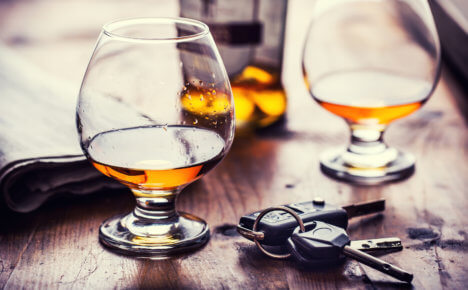
Many restaurants, hotels, and other businesses in the hospitality industry serve alcoholic beverages. These businesses are licensed to sell alcohol through state Alcohol Beverage Control agencies. Despite most states requiring additional training and certifications for those serving alcohol – including how to recognize intoxicated patrons – in order for a business to maintain its liquor license, customers sometimes drink too much and cause accidents. When this happens, the serving entity may potentially be held legally responsible for damages caused by guests who overindulged under a theory called dram shop liability.
In 2017, alcohol-impaired driving fatalities accounted for 29% of total vehicle traffic fatalities. Unfortunately, the Lone Star State leads the country in the number of DUIs each year. Most DUIs in Texas occur between 2:00am and 3:00 am, and most often on Saturday nights.
The Texas Alcoholic Beverage Commission (TABC) is Texas’ state agency that creates and enforces safe alcohol sales regulations. If an alcohol-serving establishment violates any TABC rule or regulation, TABC can punish the business and/or people responsible via fines, revocation of the liquor license, and even jail time.
What’s In A Dram?
Dram shop laws are named after the “dram,” the unit of measurement by which alcohol used to be sold. Almost every state has some form of dram shop law; however, the standard used to determine when dram shop liability applies varies from state to state.
Dram shop cases hinge on imposing civil liability upon a commercial business that serves alcohol to someone who then causes injury to himself or another person allegedly due to intoxication. Dram shop liability laws govern how and when liability can be imposed upon commercial establishments serving alcoholic beverages. The laws are intended to protect the public from the hazards of continuing to serve alcohol to already intoxicated patrons.
First Party and Third Party Dram Shop Claims
In dram shop lawsuits, the plaintiff’s relationship with a defendant determines what type of claim can be filed. Depending upon who gets injured and how, a typical dram shop plaintiff will have either a first party or third party liability case.
First Party Dram Shop Liability: First party liability is when drunk drivers (or families of the deceased) over-served by an establishment file suit and obtain compensation from the establishment if they’re injured or killed in a crash caused by their intoxication. Many states, including Texas, do not allow first party dram shop liability cases because individuals are held personally responsible for how much alcohol they consume.
Third Party Dram Shop Liability: The most common scenario in a dram shop case is when a drunk driver who was over-served at a restaurant or bar injures a third party. This is the only type of dram shop lawsuit allowed in Texas. If a customer was severed alcohol after it was apparent to the business that he was obviously intoxicated to the extent he presented a clear danger to himself or others, and the intoxication of that customer proximately causes injuries to another person, the injured party may have a third party dram shop case.
Recommended Methods of Limiting Exposure
Train Your Staff
Properly hiring and training workers who sell and serve alcohol for your business can help reduce alcohol-related liability exposure. All workers should be trained, including bartenders, servers, hosts, valet attendants, security personnel, and managers. The training should include:
- Identifying the signs of intoxication
- Avoiding serving too many drinks too quickly
- Cutting off intoxicated parties
- Checking appropriate identification to avoid serving alcohol to underage patrons
Creating a handbook or company policy for employees to follow can help provide clear guidelines on the company’s expectations for staff. Additionally, those policies should be enforced. Texas establishments should also require all employees to attend a TABC-approved training course in addition to any internal training provided by the company. The TABC classes are offered online but the certificates do expire, so establishments should ensure all employees have current TABC certificates.
Dram Shop Insurance
Also known as liquor liability insurance, dram shop insurance protects your company against damages caused by an intoxicated patron of your business. If your business manufactures, sells, serves, or facilitates the use or purchase of alcohol, then you should consider purchasing liquor liability insurance coverage.
Provide Alternate Transportation
Make it easy for bartenders, valet attendants, and other workers to quickly and easily find alternate transportation for intoxicated patrons, including ridesharing, taxis, and public transportation. While bartenders can be particularly effective in limiting the damage an intoxicated person can cause by simply cutting them off, valet attendants are often the last line of defense against an intoxicated person driving away from a restaurant or bar’s premises and causing an accident. Management should communicate with the valets so car keys are not turned over to intoxicated patrons.
Safe Harbor Defense
The Texas Dram Shop Act contains a clause specifically protecting drinking establishments from civil claims called the Safe Harbor Defense or Trained Server Defense. If an establishment can prove the employee who served the intoxicated customer attended a TABC-approved training program and that it hasn’t directly or indirectly encouraged an employee to violate the law, it may be exempt from a lawsuit.
Dram Shop Defense Lawyers
Since its inception in 1946, MehaffyWeber has successfully defended and resolved dram shop and social host liability cases. Our hospitality industry defense attorneys remain at the forefront of how these laws affect commercial businesses that provide alcohol to patrons. The Texas hospitality lawyers at MehaffyWeber have the legal knowledge necessary to help your business succeed and thrive. Contact us today to schedule an appointment with one of our experienced trial lawyers.
